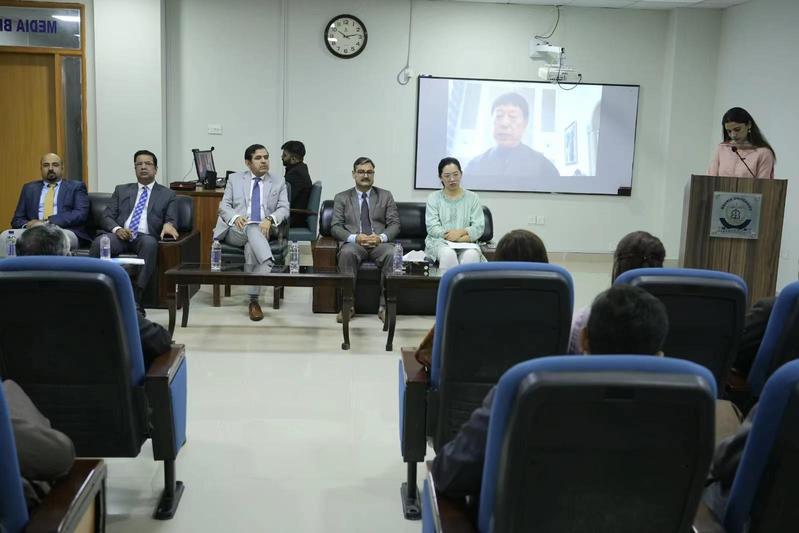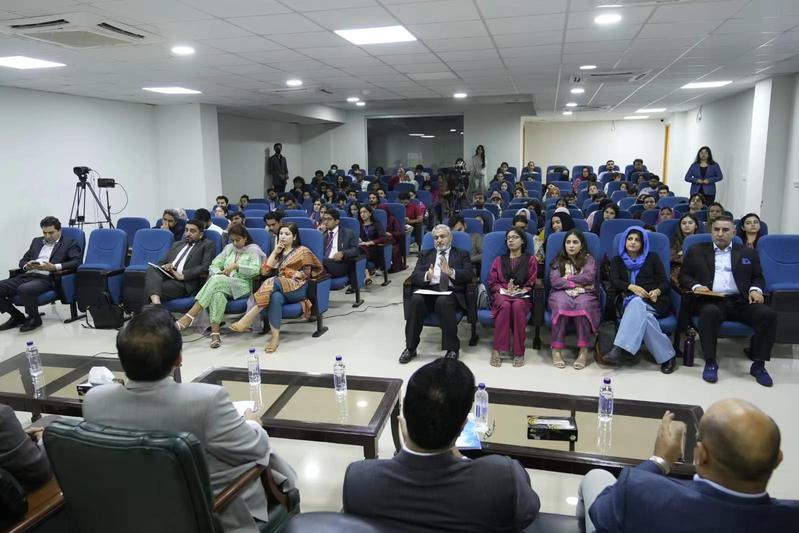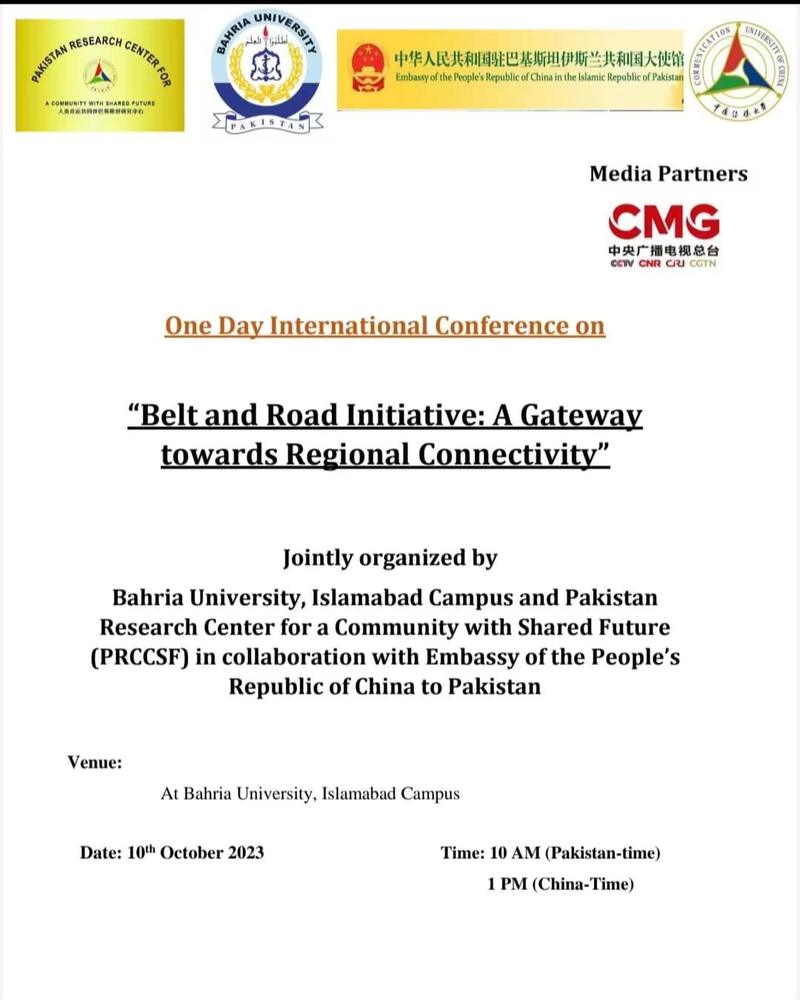On October 10, 2023, Bahria University, Islamabad Campus, and the Pakistan Research Centre for a Community with Shared Future (PRCCSF), in collaboration with the Embassy of the People’s Republic of China, organized a one-day international conference on “Belt and Road Initiative: A Gateway towards Regional Connectivity”. The main purpose of the conference is to establish an extensive link between regional stakeholders and also enhance people-to-people contacts for an understanding of the significance of regional cooperation through BRI. The Belt and Road Initiative epitomizes China's audacious endeavor to elevate global trade and connectivity. It seeks to foster economic cooperation and promote infrastructure development, ushering in a new era of collaboration among nations along its expansive routes.

The conference was moderated by Ms. Warda Malik, Lecturer, Bahria University, Islamabad.
Welcome remarks were given by Professor Dr. Adam Saud, Dean/Faculty of Humanities and Social Sciences, Bahria University, Islamabad Campus. He discussed the objectives of the conference to enlighten the students about the different aspects of BRI. BRI is a beneficial project and shares all the perspectives of regional integration.
Professor Li Huailiang, Dean of the Institute for a Community with a Shared Future, Communication University of China (CUC), Beijing, China, gave a speech on “Understanding the Belt and Road Initiative: A Comprehensive Overview”. He stated that China promotes an equitable and sustainable future by actively fostering the 17 United Nations Sustainable Development Goals (SDGs). China's commitment to sustainable development is evident, and it plays a crucial role as an important partner of the United Nations. Moreover, China is successfully sustaining its green economy. It's noteworthy that the Belt and Road Initiative (BRI) has garnered significant support from the international community.

Prof. Dr. Ali Imtiaz, Associate Bahria University Professor, gave a speech on “The Digital Silk Road: Technology and Innovation in the BRI.” He said how the digital silk road is a game changer and is bringing abundant economic opportunities. He discussed how innovation and joint technology help to connect the world. The BRI community is ready to uptake nanotechnology, quantum computing, big data, and 5G.
Ms. Hu Pingping, Director, China Media Group, Islamabad Station, presented a speech on Narrating Compelling Stories of the BRI: Insights from China Media Group. She introduced the work of the China Media Group when it was created and its work. The Urdu service of China Radio International (CRI) was launched in 1980. It conducts regular programs and video production. She discussed the pros and cons of CPEC in fostering and enhancing people-to-people contacts.
Major General Dr. Samrez Malik (Retd) former Director General of the Institute for Strategic Studies, Research, and Analysis (ISSRA), presented an analysis of CPEC in 21st-century geopolitics. He stated that people should have basic knowledge about CPEC and BRI. The China-Pakistan Economic Corridor is a game changer for Pakistan. The twenty-first century is the Asian century; the 19th and 20th century worlds were grapped in geopolitical complexes.
Ms. Cheng Jingwei, China Communication University, Beijing, presented a speech on BRI and Sustainable Development for Balancing Economic Growth and Environmental Protection. She said that, with the help of China's e-commerce platform, high-quality agriculture products from countries and regions along the BRI have entered the Chinese consumer market and achieved sales growth. BRI is committed to promoting vertical and horizontal expansion of supply chains and close cooperation among enterprises in various countries.

Mr. Khalid Taimur Akram, Executive Director, Pakistan Research Centre for a Community with Shared Future (PRCCSF), Islamabad, presented a speech on BRI and China's Global Diplomacy in Building Bridges. He stated that the Belt and Road Initiative (BRI) represents China's commitment to fostering global diplomacy through broadening cooperation in economy and trade, education, technology, tourism, and people-to-people and cultural exchanges. China's approach is based on the principle that no culture is superior to another, and it aims to coexist with other civilizations without making any attempts to dominate or impose its own culture.
Mr. Zaildar Ahsan Shah, Advocate High Court and Advisor on International Relations, Pakistan Research Centre for a Community with Shared Future (PRCCSF), Islamabad, gave a speech on “Legal Framework for the Case of Business Through the CPEC Corridor”. CPEC is a monumental initiative that not only links China and Pakistan but has the potential to reshape the entire economic landscape of the region. He said that engaging local communities along the CPEC route and addressing their concerns and interests within the legal framework can be complex. Building legal capacity within both China and Pakistan, especially in areas related to international trade, infrastructure development, and investment law, is a long-term challenge that requires investment in education and training programs.
Mr. Ovais Ali Khokhar, Chairman Advisory Board, Pakistan Research Center for a Community with Shared Future (PRCCSF), Islamabad, said China remains committed to advancing regionalism and global cooperation. BRI, with its expanding pillars and cooperative frameworks, is not just about infrastructure development but also about fostering a community with a shared future for mankind. This initiative goes beyond bilateral arrangements, embracing trilateral and multilateral collaborations and emphasizing connectivity.
Commadore Babar Bilal (Retd) gave a speech on the Maritime Silk Road's challenges and opportunities. He discussed the historical background of the Silk Road and its relevance in today’s time. He stated that economic corridors have been in use since the earliest human civilization. The creation of corridors to promote socio-economic development through a common agenda and goals He discussed the challenges, such as the trade corridor politics created by the west.
In the end, Professor Dr. Adam Saud gave closing remarks by expressing gratitude and thanking the speakers and participants for making the conference a big success. Around 130 students of social sciences attended the conference.

